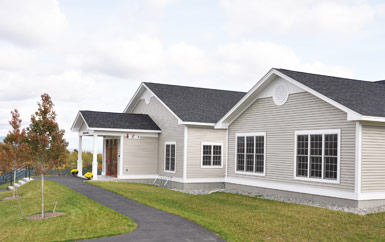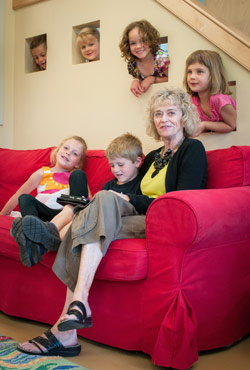
Windy Hill School at Colby-Sawyer College Earns Silver LEED Certification for Green Design
NEW LONDON, N.H., Aug. 7, 2012 – Colby-Sawyer College's Windy Hill School, an early childhood laboratory school, was recently recognized with silver certification in Leadership in Energy and Environmental Design (LEED).
The certification, awarded by the U.S. Green Building Council, encourages and facilitates the development of environmentally sustainable construction. The certification levels include certified, silver, gold and platinum.
According to the U.S. Green Building Council (USCB), LEED redefines the way we think about the places where we live, work and learn. As an internationally recognized mark of excellence, the certification process provides building owners and operators with a framework for identifying and implementing practical and measurable green building design, construction, operations and maintenance.
The USCB describes LEED certification as providing “independent, third-party verification that a building, home or community was designed and built using strategies aimed at achieving high performance in key areas of human and environmental health: sustainable site development, water savings, energy efficiency, materials selection and indoor environmental quality.”
The Windy Hill School was founded in 1976 and is a laboratory school for the Colby-Sawyer College's Social Sciences and Education Department, one of the few laboratory schools in New England. Since 2010, Windy Hill has enjoyed this beautifully designed home of its own – one that celebrates the magic and imagination of childhood and supports the teachers and college students who work with them with an optimal environment for teaching and learning.
Colby-Sawyer College, with assistance from Banwell Architects, applied for LEED certification – the recognized standard for “green” buildings – for the Windy Hill School when an anonymous donor stepped up to support the application process with a gift of $50,000.
In keeping with the college's commitment to creating an environmentally sustainable campus, Windy Hill's new school was designed and built to provide a healthy and safe environment. The building offers high visibility of the outdoors through large windows and doors with windows, and was designed to conserve energy and water, according to the architect, Ingrid Nichols, a partner at Banwell Architects. By using green and recycled materials, the architect and builder sought to ensure high-quality air would circulate throughout the school.
The two-story building, which sits on a grassy hillside overlooking Mount Kearsarge, is a bright and welcoming place filled with natural light, beautiful maple woodwork, and colorful furniture, rugs and art work. It was designed with children in mind, with built-in-lofts to play and hide in; low, round windows in the doors to spy through; and images of hot-air balloons, kites, planes and other flying things in the ceiling tiles.
“It was not only the vision of the architects – it was a collaborative effort of everyone at Windy Hill and the college, along with the builders, North Branch Construction, to create a school built on a human scale that meets the needs of the children and of the college students and teachers,” says Nichols. “We worked together to create a building that fits into the overall campus and respects the buildings and the environment around it.”

Windy Hill School Director and Associate Professor of Social Sciences and Education Janet Bliss describes the new facility as “a wonderful tribute to the importance of young children and the people who dedicate their lives to working with them.”
Colby-Sawyer's Vice President for Administration Doug Atkins described the school as a long anticipated addition to the campus and a milestone in the college's commitment to pursue its growth in a considered manner. “The LEED certification process was very helpful as it raised awareness of the things that can be included in project planning that lead to more desirable and sustainable outcomes,” he said.
Nichols always discusses the health and cost benefits of sustainable design with clients early on, and the firm has designed 10 LEED-certified buildings. The Windy Hill School's integrated design allowed the engineers to create tight air barriers that optimize energy use and allows for reductions in the mechanical equipment required to operate the building.
“You save on upfront engineering costs throughout the building and then save on energy costs going forward,” she said. “People should not think LEED certification is going to cost so much that they shouldn't do it. It's important to discuss the guidelines to learn about the benefits, even if you don't follow through with the certification process.”
At the Windy Hill School, artificial light is seldom needed during the day, due to the large size and design and placement of the windows, which maximize natural light. Most of the flooring is made from recycled materials, and low-flow toilets and sinks are used in the building as well. Green-certified materials, some of which were recycled, were used, as was low-VOC (volatile organic compounds) paints and sealants.
“Ultimately, a greener building creates a more healthy and safe environment,” said Nichols. “This was extremely important to everyone involved in this project. It was wonderful the amount of energy and passion the administration and staff and teachers put into making Windy Hill the best and healthiest space possible. It was astounding—a great team effort!”
To arrange a visit to the facilities located on the campus of Colby-Sawyer College, request a brochure, or make inquiries about the programs e-mail the Windy Hill School at cbetz@colby-sawyer.edu or call the office at 603-526-3695.
To learn more about the LEED certification and the U.S. Green Building Council visit http://www.usgbc.org
-Cynthia Driver
Cynthia Driver is an English major at Colby-Sawyer College and a summer intern with College Communications.
Colby-Sawyer College is a comprehensive college that integrates the liberal arts and sciences with professional preparation. Founded in 1837, Colby-Sawyer is located in the scenic Lake Sunapee Region of central New Hampshire.
Colby-Sawyer College, 541 Main Street, New London, N.H. 03257 (603) 526-3000


